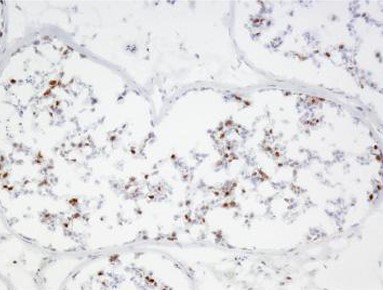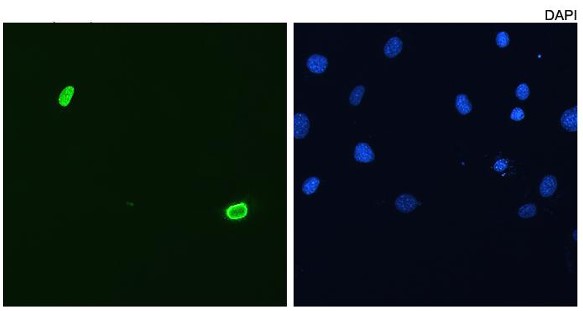Anti-DUX4 Antibody (57101)
Anti-DUX4 Antibody (57101)
Product No.: 57101
- -
- -
Clone P2B1 Target DUX4 Formats AvailableView All Product Type Monoclonal Alternate Names Double homeobox protein 10 Isotype Mouse IgG1 Applications IF , IHC |
Data
- -
- -
Antibody DetailsProduct DetailsReactive Species Human Host Species Mouse Immunogen C-terminal 76 amino acids of DUX4 with glutathione-s-transferase (gst) tag. Product Concentration Lot Specific Formulation This monoclonal antibody is formulated in phosphate buffered saline (PBS) pH 7.2 - 7.4 with no carrier protein or preservatives added. State of Matter Liquid Product Preparation Antibodies are purified by a multi-step process including the use of protein A or G to assure extremely low levels of endotoxins, leachable protein A or aggregates. Storage and Handling Upon initial thawing, appropriately aliquot and store at -80°C. For long-term storage, keep at -80°C. Avoid repeated freeze-thaw cycles. Country of Origin USA Shipping Next Day 2-8°C Each investigator should determine their own optimal working dilution for specific applications. See directions on lot specific datasheets, as information may periodically change. DescriptionDescriptionSpecificity This antibody recognizes human DUX4. It does not cross-react with DUX4c. Background Facioscapulohumeral muscular dystrophy (FSHD) is caused by the deletion of a subset of D4Z4 macro-satellite repeats on chromosome 4. Each repeat contains a retrogene encoding the double-homeobox factor DUX4. DUX4 expression is epi- genetically suppressed in differentiated tissues, and the residual DUX4 transcripts are spliced to remove the carboxyterminal domain that has been associated with cell toxicity. In FSHD individuals, the expression of the full-length DUX4 transcript is not completely suppressed in skeletal muscle and possibly other differentiated tissues. Function [Isoform 1]: Transcription factor that is selectively and transiently expressed in cleavage-stage embryos (PubMed:28459457). Binds to double-stranded DNA elements with the consensus sequence 5'-TAATCTAATCA-3' (PubMed:28459457, PubMed:28459454, PubMed:29572508, PubMed:30540931, PubMed:30315230). Binds to chromatin containing histone H3 acetylated at 'Lys-27' (H3K27ac) and promotes deacetylation of H3K27ac. In parallel, binds to chromatin that lacks histone H3 acetylation at 'Lys-27' (H3K27ac) and recruits EP300 and CREBBP to promote acetylation of histone H3 at 'Lys-27' at new sites (PubMed:26951377). Involved in transcriptional regulation of numerous genes, primarily as transcriptional activator, but mediates also repression of a set of target genes (PubMed:17984056, PubMed:27378237, PubMed:26951377, PubMed:28459457, PubMed:28459454, PubMed:29618456, PubMed:30540931, PubMed:29572508). Promotes expression of ZSCAN4 and KDM4E, two proteins with essential roles during early embryogenesis (PubMed:27378237, PubMed:26951377, PubMed:28459457, PubMed:29618456). Heterologous expression in cultured embryonic stem cells mediates also transcription of HERVL retrotransposons and transcripts derived from ACRO1 and HSATII satellite repeats (PubMed:28459457). May activate expression of PITX1 (PubMed:17984056). May regulate microRNA (miRNA) expression (PubMed:24145033). Inappropriate expression can inhibit myogenesis and promote apoptosis (PubMed:26951377, PubMed:28935672, PubMed:29618456). {PubMed:17984056, PubMed:24145033, PubMed:26951377, PubMed:27378237, PubMed:28459454, PubMed:28459457, PubMed:28935672, PubMed:29572508, PubMed:29618456, PubMed:30315230, PubMed:30540931}.; [Isoform 2]: Probably inactive as a transcriptional activator, due to the absence of the C-terminal region that is important for transcriptional activation. Can inhibit transcriptional activation mediated by isoform 1. Heterologous expression of isoform 2 has no deleterious effect on cell survival. {PubMed:29618456}. NCBI Gene Bank ID UniProt.org Research Area Neuroscience References & CitationsSnider L et al 2010 PLoS Genetics 6: 1-14. |




